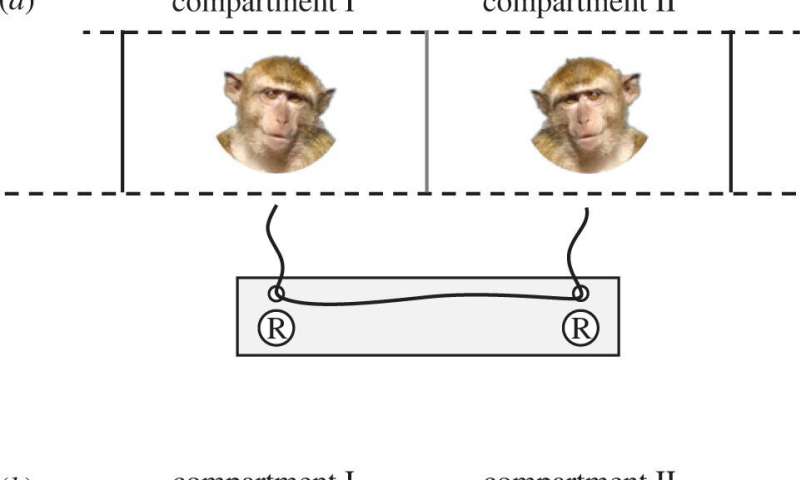Experiments with macaques show lower stress levels when working with a friend toward a goal
by Bob Yirka
A team of researchers from the University of Vienna and the Biomedical Primate Research Centre in Rijswijk, the Netherlands, has found that macaques have lower stress levels when working toward a goal as a bonded dyad. In their paper published in the journal Royal Society Open Science the group describes experiments they conducted with captive macaques and what they learned from them.
Common sense suggests that when people work together in peaceful accord toward a common goal, their stress levels are lower than when working with a stranger, on in some cases, than when working alone. In this new effort, the researchers wondered if the same might be true of macaques.
Macaques are a genus of old-world monkeys that live in Asia and North Africa. They are known for their intricate matriarchal social groups which are generally hierarchal. They are also known for their widespread use in animal testing. In this new effort, the researchers were working in the Netherlands with macaques living in the Biomedical Primate Research Centre. Their goal was to learn more about monkey stress levels as they engaged in typical behaviors, such as working to win a food reward.
The researchers began their study by winnowing out test monkeys at the research center—they selected only those who successfully learned to provide a saliva sample on demand. They also noted which of the monkeys they had chosen had bonded with another monkey prior to the study. The monkeys were then taught to use a string to pull a platform close enough for them to retrieve a food bit off of it. But the platform was rigged in different ways. In some cases, one monkey could do it alone; in other cases, paired monkeys both had to pull on a string in order to retrieve their prize. After each trial, the monkeys were asked to give up a saliva sample for testing—cortisol levels in the saliva were used to gauge stress levels.
The researchers found that those monkeys who were paired with a bonded friend had the lowest levels of cortisol, suggesting that they were the least stressed of all the monkeys in the test groups.
More information: Martina Stocker et al. Cooperation with closely bonded individuals reduces cortisol levels in long-tailed macaques, Royal Society Open Science (2020). DOI: 10.1098/rsos.191056
Journal information: Royal Society Open Science
© 2020 Science X Network